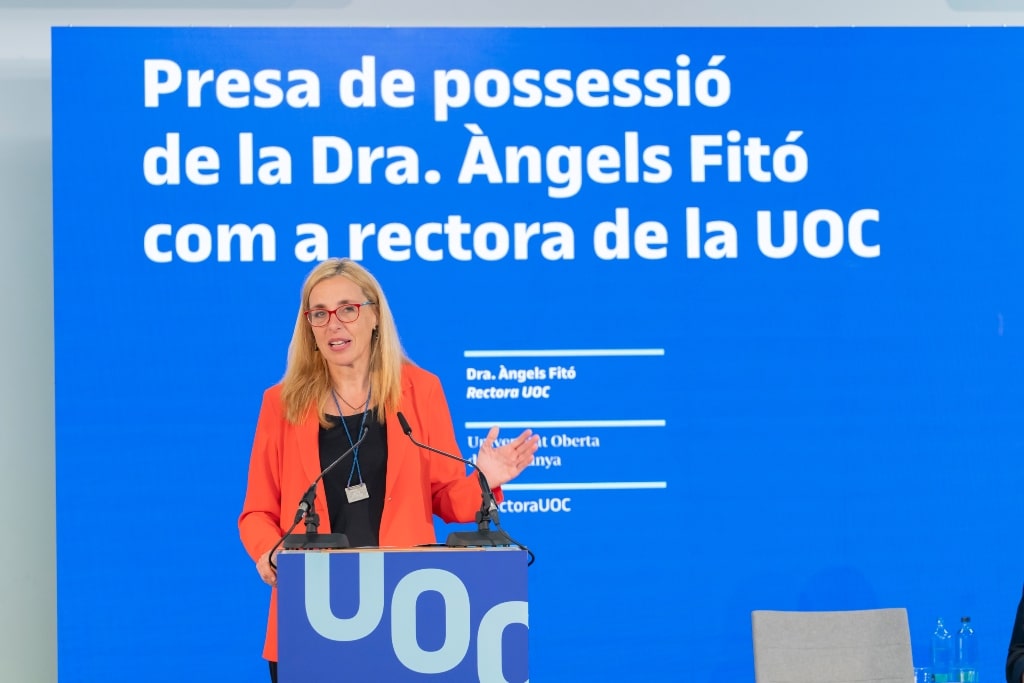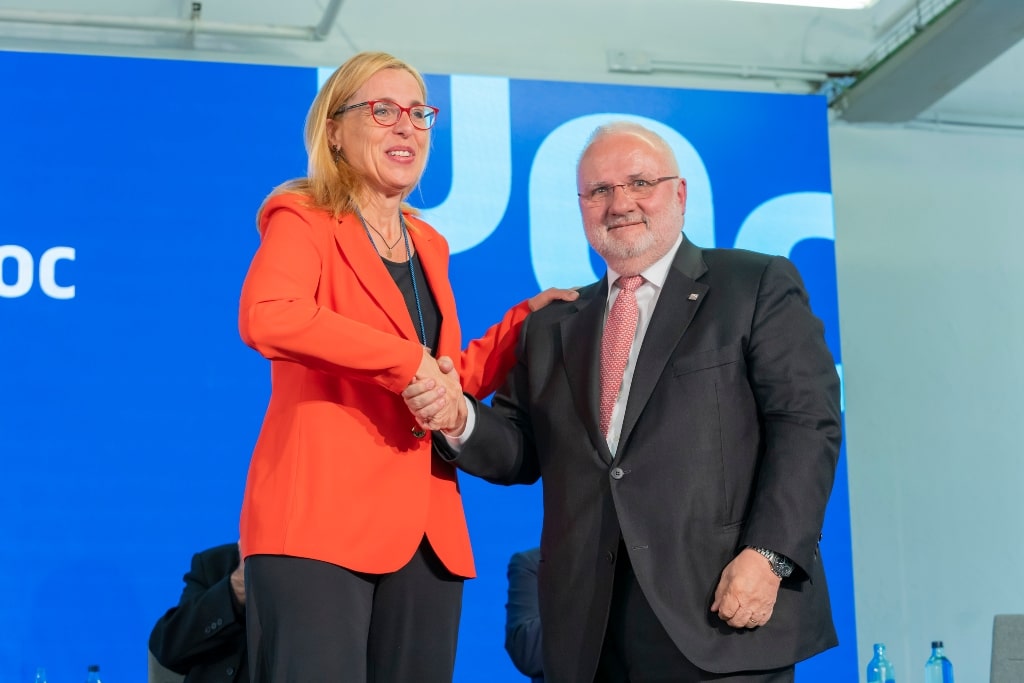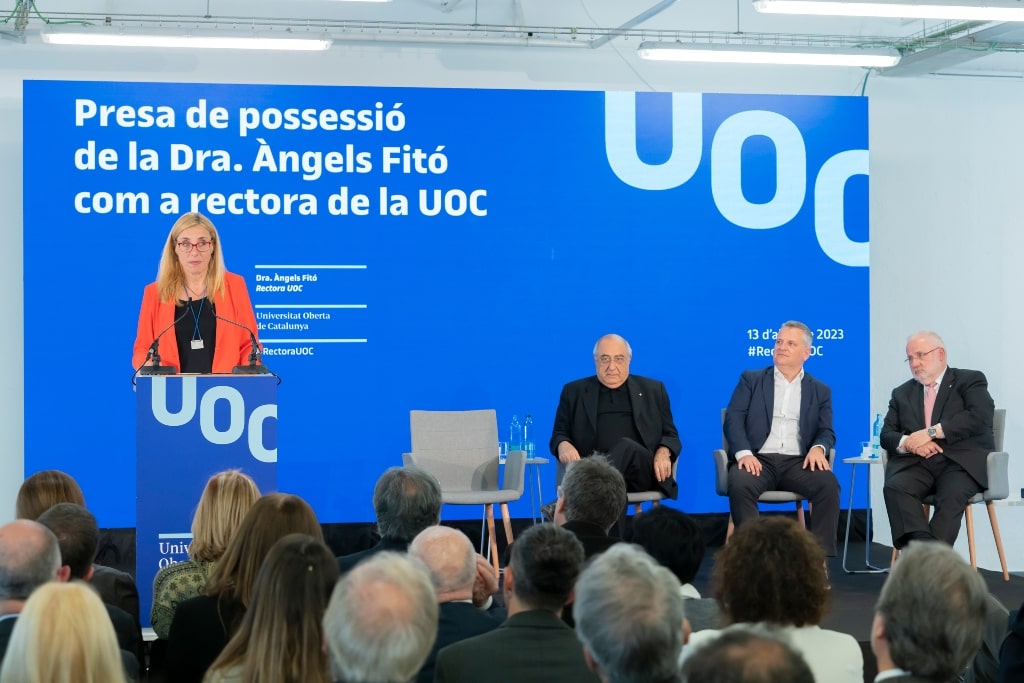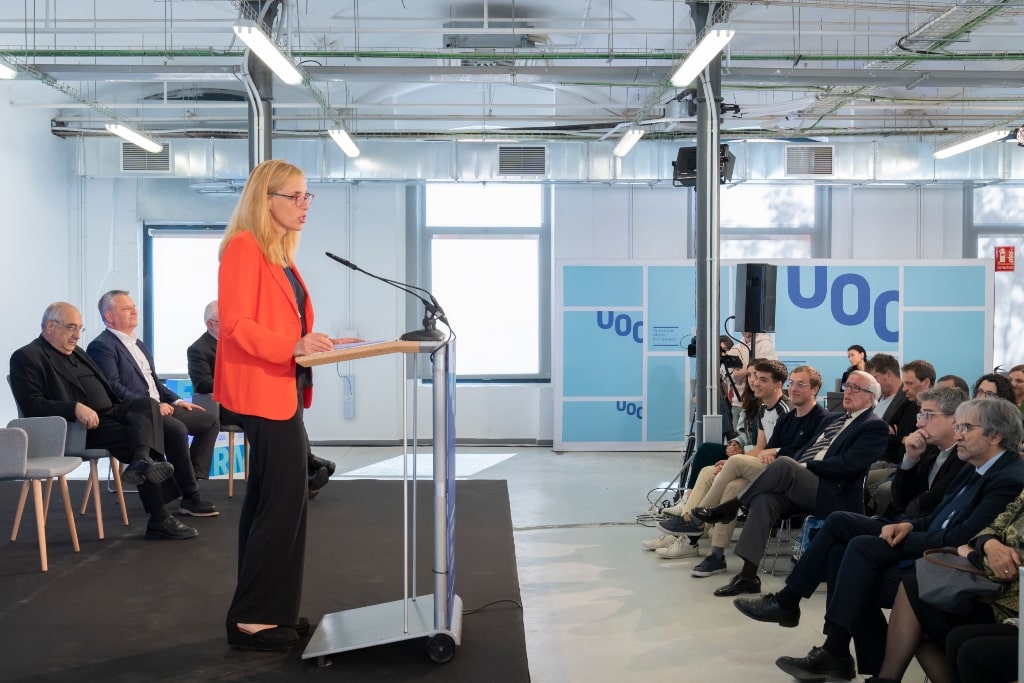Evolution, alliances and societal impact: the three principles to mark Àngels Fitó's term in office as president of the UOC
Economist Àngels Fitó inaugurated as president of the Universitat Oberta de CatalunyaÀngels Fitó was inaugurated this Thursday, 13 April, as the new president of the UOC in a ceremony held in the auditorium at the Can Jaumandreu building. Fitó described how the project she envisages as she leads the university can be summarized in three principles. Firstly, "evolution of the things we do well and revolution of the things we can do better". She highlighted open, shared pathways; personalized, pedagogical and professional support, and open transdisciplinary and translational research as a driver of change among the most important values that the university stands for. Secondly, "working alongside others is working better", she said as she underlined how "the UOC, just like people, is stronger in alliances". And thirdly, she stressed that "societal impact is a must".
At the ceremony for her inauguration as the new president of the UOC, Àngels Fitó was accompanied by the Minister for Research and Universities of the Government of Catalonia, Joaquim Nadal; the president of the FUOC's Board of Trustees, Pere Vallès; the outgoing president of the UOC, Josep A. Planell; the directors-general for Universities and Research; rectors from the Catalan universities; members of the FUOC's Board of Trustees and Advisory Board; representatives from Barcelona City Council, and members of the university's teaching and administrative staff.
In her speech, Fitó compared the UOC to an opera, "understood as a work of complete art, where all skills come together, all abilities and all know-how," but which "needs someone to come up with it and to make it possible". She highlighted the work of her predecessor, President Josep A. Planell, as the person who had taken on this role. "Rather than try to equalize everyone's virtues, President Planell has been able to unite the potential of the different parts around a common goal," she said. She praised the former president, stressing how "with empathy, rigour, sensitivity and knowing how to listen, he has been able to give each individual the confidence they needed to join in the harmony and synchrony of the shared project".
Fitó said that she could count on a "powerful triad" to ensure the conditions needed and guarantee the future of the UOC: "the project, the team and the leadership". The project is "engaging and ready" – she sees it as being "so simple, and yet so difficult, to go back to our roots as we adapt to the new reality: make technology a virtue; from research gain evidence, and from alliances create a system". She also had words for her team, which is "excited and committed", and which wants to be renowned for doing things well. She stressed that "our commitment is to knowledge […] knowledge understood in the widest terms, able to take on the four missions identified by the European University Association as key as we look to 2030: teaching, research, innovation and culture."
In turn, outgoing president, Josep A. Planell, took stock of the many things he had learned during the decade in which he had led the university. The first was linked to the role of the UOC as an institution that "has become systemic within the Catalan and Spanish university sector", where its pioneering nature "has played a leading part". He also stressed the UOC's international scope, which has seen it able to generate a network that aims to produce "an exchange that is doubly rewarding: offering and presenting that which we know, while learning and integrating that which others are able to teach us". Lastly, he talked about first-hand experiences that underlined how "our work becomes meaningful at the graduation ceremonies, where you become aware of the real impact the UOC has". He recalled two particularly touching moments: "when Hisham, a refugee from war and graduate of the UOC, took to the stage to say that 'there is no shame in being poor, but no excuse for being ignorant' or when 67-year-old Maria Lluïsa graduated with a degree in Business Administration after the patriarchy had made her put her studies on hold".
The event also involved the president of the FUOC's Board of Trustees, Pere Vallès, who highlighted the irrefutable achievement of the university's reaching a quarter of a century without falling into "monotony and lethargy", instead the university has "consolidated what was a pioneering project and made it systemic and always up-to-date". Likewise, he stressed how the changing of the guard from President Planell to President Fitó exemplified "that which should be normal: institutional continuity and the unique nature of the leaderships".
Joaquim Nadal, Catalan Minister for Research and Universities, described how within the Catalan university system as a whole – a system that is both consolidated, and strong in terms of academia, teaching and research – the UOC is "unique". "Based on a law and a role that is specific and unique, the UOC is a cutting-edge university, because it allows the structural frameworks to function correctly". Nadal thanked President Planell for his work and encouraged President Fitó for the future, and he stressed that the main challenge was not losing sight of how, from one year to the next, there is a constant aggiornamento, or updating, of the knowledge that makes universities competitive at the highest levels. "The UOC, in its field, has to be able to understand how the world and society are evolving and changing; what the challenges are; what inertia needs to be overcome; what the risks are and what values we must use to build tools that make the knowledge and research system the most important basis of what represents a modern country".
Who is Àngels Fitó?
Àngels Fitó has a PhD in Economics from the University of Barcelona, is a senior professor at the UOC, and has been Vice President for Competitiveness and Employability since 2019.
Between October 2010 and February 2019, she was dean of the UOC's Faculty of Economics and Business. Throughout her academic career, she has specialized in tax and financial management and management control, and has taught courses on these subjects at a number of universities (University of Barcelona, Universitat Politècnica de Catalunya, Universitat Autònoma de Barcelona, Pompeu Fabra University, and the University of Vic - Central University of Catalonia). She combined her teaching work with a professional career in accounting and tax consulting for private companies and public institutions.
She has also been deputy chair of the Catalan Association of Economists and a member of the Government of Catalonia's Economic Policy Advisory Board. Her research interests focus on financial reporting harmonization processes, management control systems and the transformative power of higher education for employability given the complexity of labour market dynamics. She leads a number of different local and international initiatives in this field to reconfigure higher education and provide a response to the challenges for lifelong learning arising in the current context of transition.
Born in Barcelona in 1970, she is the mother of three children and author of three novels.
Press contact
-
Editorial department




